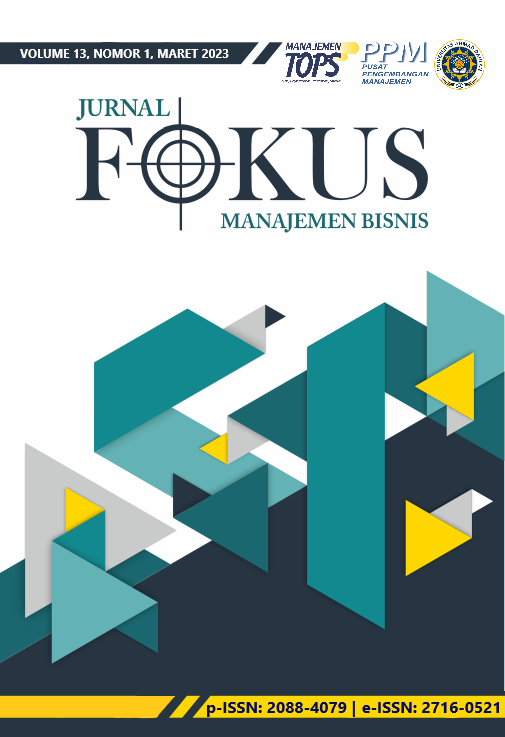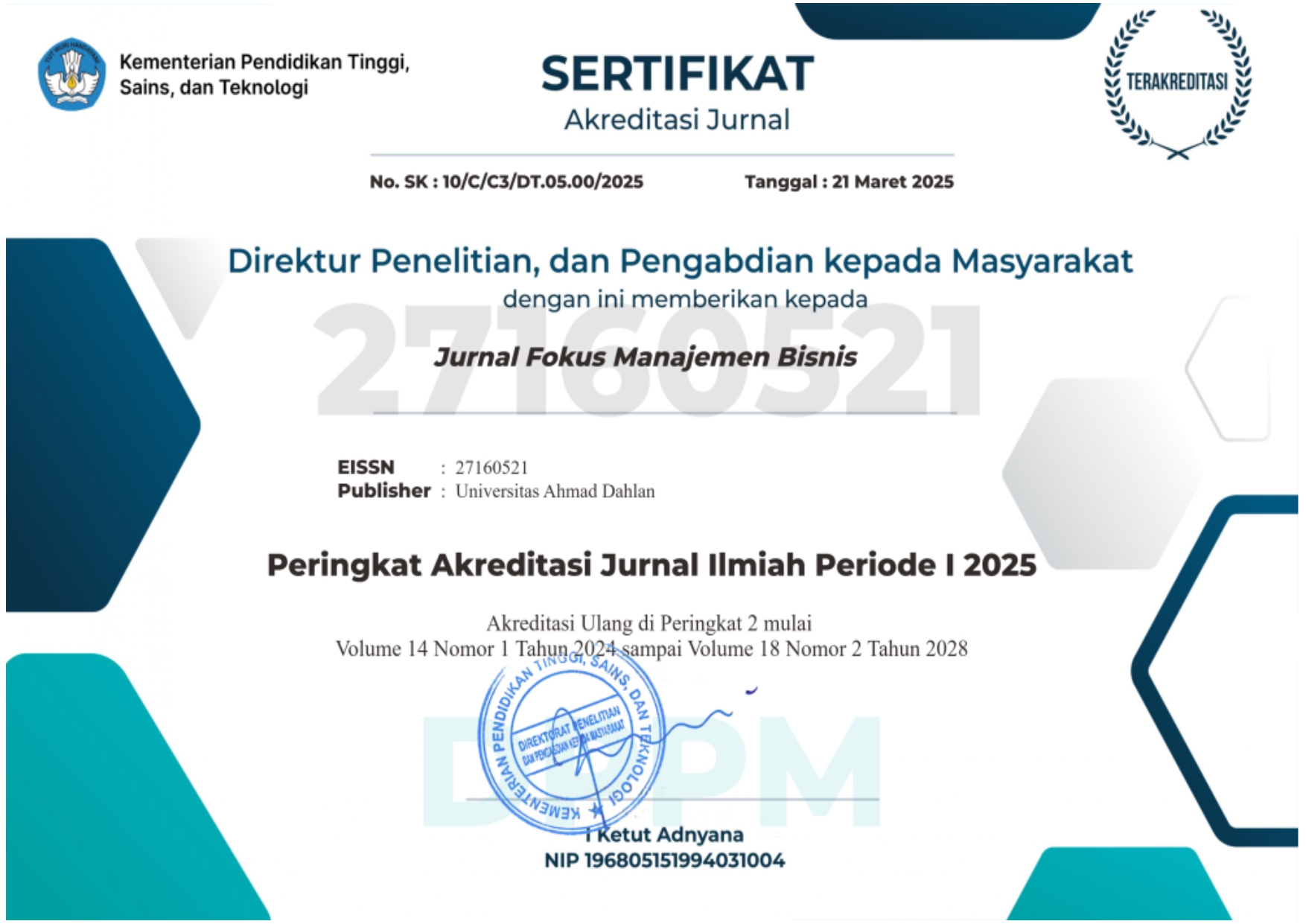PENGARUH ZAKAT DAN MODAL INTELEKTUAL PADA KINERJA PERBANKAN SYARIAH DI INDONESIA
DOI:
https://doi.org/10.12928/fokus.v13i1.7244Abstract
The banking industry, especially Islamic Banking in Indonesia, experiences rapid yearly development. This development is influenced by increasing performance. This study aims to examine the effect of zakat and intellectual capital on the performance of Islamic Banking in Indonesia. The sampling technique used was the purposive sampling method. Data obtained from the annual report of Islamic Banking in Indonesia registered with The Central Bank of Republic of Indonesia and The Financial Services Authority from 2011-2020. Data analysis is carried out with validity tests, reliability tests, and hypothesis tests with the help of SPSS applications. The results showed that zakat and intellectual capital variables proved to have no effect on the performance of Islamic Banking in Indonesia for the 2011-2020 period.
References
Ahmad, M. (2019). An empirical study of the challenges facing zakat and waqf institutions in Northern Nigeria. ISRA International Journal of Islamic Finance, 11(2). https://doi.org/10.1108/IJIF-04-2018-0044
Auliyah, R., & Basuki, B. (2021). Ethical Values Reflected on Zakat and CSR: Indonesian Sharia Banking Financial Performance. Journal of Asian Finance, Economics and Business, 8(1). https://doi.org/10.13106/jafeb.2021.vol8.no1.225
Berzkalne, I., & Zelgalve, E. (2014). Intellectual Capital and Company Value. Procedia - Social and Behavioral Sciences, 110. https://doi.org/10.1016/j.sbspro.2013.12.934
Bontis, N., William Chua Chong, K., & Richardson, S. (2000). Intellectual capital and business performance in Malaysian industries. Journal of Intellectual Capital, 1(1). https://doi.org/10.1108/14691930010324188
Damayanti, C. (2015). Pengaruh Modal Intelektual Terhadap Kinerja Keuangan Perusahaan Perbankan Yang Terdaftar Di Bursa Efek Indonesia (BEI) Tahun 2010–2013. STIE Perbanas Surabaya.
Edvinsson, L., & Malone, M. S. (1997). Intellectual Capital: Realizing Your Company’s. True Value by Finding Its Hidden Brainpower. HarperCollins.
Ferraro, O., & Veltri, S. (2011). The value relevance of intellectual capital on the firm’s market value: An empirical survey on the Italian listed firms. International Journal of Knowledge-Based Development, 2(1). https://doi.org/10.1504/IJKBD.2011.040626
Ghozali, I. (2018). Aplikasi Analisis Multivariate dengan Program IBS SPSS 25 (9th ed). Badan Penerbit Universitas Diponegoro.
Gogan, L.-M., & Draghici, A. (2013). A Model to Evaluate the Intellectual Capital. Procedia Technology, 9. https://doi.org/10.1016/j.protcy.2013.12.096
Hashim, M. J., Osman, I., & Alhabshi, S. M. (2015). Effect of Intellectual Capital on Organizational Performance. Procedia - Social and Behavioral Sciences, 211. https://doi.org/10.1016/j.sbspro.2015.11.085
Indriantoro, N., & Supomo, B. (2013). Metodologi Penelitian Bisnis Untuk Akuntansi & Manajemen. BPFE Yogyakarta.
Javaid, S., & Al-Malkawi, H. A. N. (2018). Corporate social responsibility and financial performance in Saudi Arabia: Evidence from Zakat contribution. Managerial Finance, 44(6). https://doi.org/10.1108/MF-12-2016-0366
Kalimah, S. (2020). Manajemen Zakat dalam Upaya Peningkatan Kesejahteraan Umat. Salimiya: Jurnal Studi Ilmu Keagamaan Islam, 1(2).
Karim, S., Naeem, M. A., & Abaji, E. E. (2022). Is Islamic FinTech Coherent with Islamic Banking? A Stakeholder’s Perspective during Covid-19. Heliyon, 8(9). https://doi.org/10.1016/j.heliyon.2022.e10485
Kartika, M., & Hatane, S. E. (2013). Pengaruh Intellectual Capital Pada Profitabilitas Perusahaan Perbankan yang Terdaftar di Bursa Efek Indonesia Pada Tahun 2007-2011. Business Accounting Review, 1(2).
Khambali, K. B. M., Hamzah, Z. L., Daud, M. Z., & Johari, F. (2016). Managing the Institution of Zakat: Case Study of Muallaf in Selangor, Malaysia. In Advances in Islamic Finance, Marketing, and Management. https://doi.org/10.1108/978-1-78635-899-820161016
Lee, I. A. (2008). Relationship between the use of Information Technology (IT) and performances of Human Resources Management (HRM). Dissertation Abstracts International Section A: Humanities and Social Sciences, 69(4-A).
Lu, W. M., Wang, W. K., & Kweh, Q. L. (2014). Intellectual capital and performance in the Chinese life insurance industry. Omega (United Kingdom), 42(1). https://doi.org/10.1016/j.omega.2013.03.002
Madella, A., Bayle, E., & Tome, J. (2005). The organisational performance of national swimming federations in Mediterranean countries: A comparative approach. European Journal of Sport Science, 5(4). https://doi.org/10.1080/17461390500344644
Mangkunegara, A. P., & Waris, A. (2015). Effect of Training, Competence and Discipline on Employee Performance in Company (Case Study in PT. Asuransi Bangun Askrida). Procedia - Social and Behavioral Sciences, 211. https://doi.org/10.1016/j.sbspro.2015.11.165
Marito, N., N, N., & Hardana, A. (2021). Pengaruh Zakat Perbankan dan Corporate Social Responsibility terhadap Kinerja PT. Bank Muamalat Indonesia. Journal of Islamic Social Finance Management, 2(2). https://doi.org/10.24952/jisfim.v2i2.5014
Martinez-Conesa, I., Soto-Acosta, P., & Palacios-Manzano, M. (2017). Corporate social responsibility and its effect on innovation and firm performance: An empirical research in SMEs. Journal of Cleaner Production, 142. https://doi.org/10.1016/j.jclepro.2016.11.038
Obeidat, B. Y., Abdallah, A. B., Aqqad, N. O., Akhoershiedah, A. H. O. M., & Maqableh, M. (2017). The Effect of Intellectual Capital on Organizational Performance: The Mediating Role of Knowledge Sharing. Communications and Network, 09(01). https://doi.org/10.4236/cn.2017.91001
Oktavian, M., & Ahmar, N. (2019). The effect of managerial ownership, institutional ownership, and foreign ownership on intellectual capital. The Indonesian Accounting Review, 9(1). https://doi.org/10.14414/tiar.v9i1.1631
Purbasari, I. (2015). Pengelolaan Zakat Oleh Badan Dan Lembaga Amil Zakat Di Surabaya Dan Gresik. Mimbar Hukum-Fakultas Hukum Universitas Gadjah Mada, 27(1). https://doi.org/10.22146/jmh.15911
Riahi-Belkaoui, A. (2003). Intellectual capital and firm performance of US multinational firms:A study of the resource-based and stakeholder views. Journal of Intellectual Capital, 4(2). https://doi.org/10.1108/14691930310472839
Sidharta, I., & Affandi, A. (2016). The empirical study on intellectual capital approach toward financial performance on rural banking sectors in Indonesia. International Journal of Economics and Financial Issues, 6(3).
Sidik, I., & Reskino, R. (2016). Zakat and Islamic Corporate Social Responsibility: Does It Take Effect to the Performance of Shari’a Banking? Shirkah: Journal of Economics and Business, 1(2). https://doi.org/10.22515/shirkah.v1i2.23
Sofian, S., Taylesh, M. E., & Pike, R. H. (2004). Intellectual Capital: An Evolutionary Change in Management Accounting Practices. Fourth Asia Pacific Interdisciplinary Research in Accounting Conference.
Subaida, I., Nurkholis, N., & Mardiati, E. (2018). Effect of Intellectual Capital and Intellectual Capital Disclosure on Firm Value. Jurnal Aplikasi Manajemen, 16(1). https://doi.org/10.21776/ub.jam.2018.016.01.15
Susanti, N., Widajatun, V. W., Sumantri, M. B. A., & Nugraha, N. M. (2020). Implications of Intellectual Capital Financial Performance and Corporate Values (Studies on Goods and Consumption Sector 2013-2017 period). International Journal of Psychosocial Rehabilitation, 24(07).
Syurmita, S., & Fircarina, M. J. (2020). Pengaruh Zakat, Islamic Corporate Social Responsibility dan Penerapan Good Governance Bisnis Syariah terhadap Reputasi dan Kinerja Bank Umum Syariah di Indonesia. Jurnal Al Azhar Indonesia Seri Ilmu Sosial, 1(2). https://doi.org/10.36722/jaiss.v1i2.463
Tandelilin, E. (2010). Dasar-dasar Manajemen Investasi. Manajemen Investasi.
Tertius, M. A., & Christiawan, Y. J. (2010). Pengaruh Good Corporate Governance terhadap Kinerja Perusahaan pada Sektor Keuangan. Majalah Ilmiah INFORMATIKA, 3(2).
Tuan Ibrahim, T. A. F., Hashim, H. A., & Mohamad Ariff, A. (2020). Ethical values and bank performance: evidence from financial institutions in Malaysia. Journal of Islamic Accounting and Business Research, 11(1). https://doi.org/10.1108/JIABR-11-2016-0139
Ullmann, A. A. (1985). Data in Search of A Theory: A Critical Examination of The Relationships among Social Performance, Social Disclosure, and Economic Performance of US Firms. Academy of Management Review, 10(3). https://doi.org/10.5465/amr.1985.4278989
Van Schaik, D. (2001). Islamic Banking. The Arab Bank Review, 3(1), 45–52.
Wang, Z., Sharma, P. N., & Cao, J. (2016). From knowledge sharing to firm performance: A predictive model comparison. Journal of Business Research, 69(10). https://doi.org/10.1016/j.jbusres.2016.03.055
Wernerfelt, B. (1995). The resource‐based view of the firm: Ten years after. Strategic Management Journal, 16(3). https://doi.org/10.1002/smj.4250160303
Youndt, M. A., Subramaniam, M., & Snell, S. A. (2004). Intellectual Capital Profiles: An Examination of Investments and Returns. Journal of Management Studies, 41(2). https://doi.org/10.1111/j.1467-6486.2004.00435.x
Downloads
Published
How to Cite
Issue
Section
License
Copyright (c) 2023 Andy Passyada Salampessy

This work is licensed under a Creative Commons Attribution-ShareAlike 4.0 International License.
Authors who publish with this journal agree to the following terms:Â
- Authors retain copyright and grant the journal right of first publication with the work simultaneously licensed under a Creative Commons Attribution License that allows others to share the work with an acknowledgment of the work's authorship and initial publication in this journal.
- Authors are able to enter into separate, additional contractual arrangements for the non-exclusive distribution of the journal's published version of the work (e.g., post it to an institutional repository or publish it in a book), with an acknowledgment of its initial publication in this journal.
- Authors are permitted and encouraged to post their work online (e.g., in institutional repositories or on their website) prior to and during the submission process, as it can lead to productive exchanges, as well as earlier and greater citation of published work (See The Effect of Open Access).







